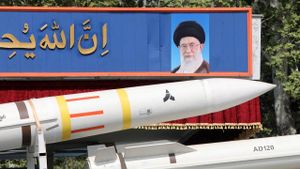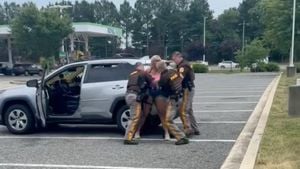Election season is upon the United States, and with it, the atmosphere of tension and anxiety is palpable. The impending presidential election on November 8, 2024, has not just rekindled traditional political rivalries but has also brought with it significant concerns about security and the potential for violence at the polls. From attacks on election workers to the rhetoric surrounding the candidates, the climate can only be described as fraught with danger.
The 2024 race has been framed as one of high stakes, with Vice President Kamala Harris and former President Donald Trump portraying the election as pivotal to the nation’s character and future. Voters resonate with these warnings, embodying feelings of anxious anticipation as they approach polling places. The underlying fears of political violence and unrest loom large, creating a spectacle where simplicity and civility of democracy feel increasingly overshadowed.
Incidents of electoral violence are already being reported, signaling this election could be one of the most tumultuous yet. Recent events support this narrative. On November 4, 2024, just days before the presidential election, an incident arose when 24-year-old Daniel Schmidt was arrested at a polling location in Illinois for allegedly punching an election judge. This confrontation, which reportedly began when Schmidt attempted to cut in line for early voting, escalated quickly.
According to local authorities, Schmidt did not respond to the directives of election officials at the Orland Park, Illinois, polling place. When told to return to the end of the line, Schmidt reacted aggressively, yelling obscenities and throwing punches at the election judge. This incident occurred amid broader concerns about election security, with experts warning of rising threats to both election officials and voters.
And Schmidt's case isn't the only troubling episode. Other coercive actions have emerged across various states, including bomb threats and attempts to undermine the electoral process, such as ballots being burnt. These acts raise severe questions about the future of electoral integrity and public trust.
Election officials across the United States are not taking these threats lightly. They have adopted heightened security measures, reminiscent of protocols put in place after the tumultuous 2020 election, which saw unprecedented attacks on the electoral process and threats against poll workers. Many have undertaken training on de-escalation tactics and have conducted drills on how to respond to possible violent situations.
The atmosphere is charged. Voters who spoke to reporters expressed feelings of unease as they prepared to cast their votes. One voter from Michigan, echoing widespread sentiments, stated, “It just feels different this year. There’s this heaviness, as if we’re all just waiting for something to go wrong, something catastrophic.”
Even as anxiety mounts, officials reiterate their commitment to ensuring safe and secure voting. “It is important for the public to know they can vote safely,” asserted Chris Boonstra, head of election security at the National Association of Secretaries of State. He emphasized, “We have protocols and systems in place to protect voters and elections.”
Experts suggest the hostile climate stems from several factors, including hyper-political divisiveness, misinformation campaigns, and social media fueling tensions. The battle for political office has become more than just policy disagreements; it has twisted itself around issues of identity and belonging, with both parties leaning heavily on fear-based messaging to mobilize their bases.
Polling shows considerable anxiety leading up to election day, with many Americans fearing possible violence at the polls, coupled with worries about post-election unrest. The sentiments reflect discontent not just with candidates but with the established norm of peaceful democratic transitions.
This anxiety was only intensified by incidents like the arrest of Skyler Philippi, who attempted to carry out violent attacks on energy infrastructure linked to extremist motivations. Philippi was thwarted by FBI intervention before he could carry out his plans, which were motivated by ideologies rooted deep within the violent fringes of extremism. This case was part of broader FBI efforts to monitor and counter violent extremist threats leading up to the election.
Such incidents highlight the reality of what many election officials and voters are confronted with: the existence of domestic terrorism threats directly linked to political ideologies and the potential for these ideologies to incite violence during one of the most sacred democratic processes.
Across the political spectrum, there is awareness of the need for vigilance. Both parties have condemned the increasing tide of violence aimed at disrupting the electoral process. Congressional committees have been convened to discuss security measures, and stroke-by-stroke, strategies are being employed to bolster the integrity of voting, even as the perceived threats nearby loom large.
Vote early, vote safely translates to not just casting the ballot, but also ensuring the freedom of movement and expression doesn’t include the fear of violent retribution. A culture of fear threatens the very fabric of what elections are supposed to represent—the voice of the people.
Despite the challenges, many Americans remain determined to fulfill their civic duty. For numerous citizens, the struggle for democracy transcends the political candidates and their views—it's about the right to express themselves freely, without intimidation.
With Election Day around the corner, voters across the nation echo similar concerns and hopes, striving for safe spaces to engage in their democratic rites, hopeful the true spirit of democracy can still prevail amid the chaos. When the dust of the campaign settles, the only question left to answer will be how delivered their vote may resound beyond the ballots.
While there’s no denying the pressures building, the pivotal act of voting remains heroically beneficial. For American voters, casting ballots isn’t just about preference; it’s about claiming stakes on futures for themselves and the next generations.
Each citizen holds the quivering echo of democracy close as they march forward, standing resolute not for fear but for hope. The results of these elections, fraught with tension or triumph, won’t just etch the future direction of the country but will resonate through the annals of what it means to partake in democracy.



